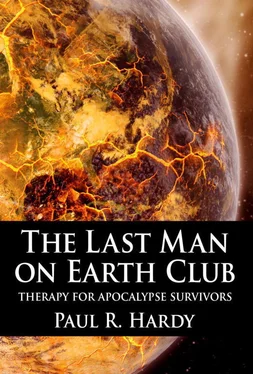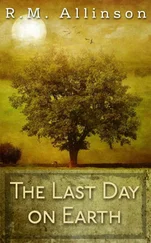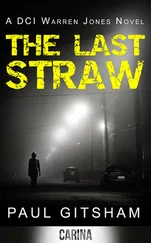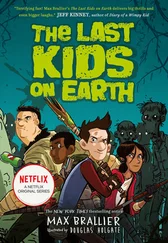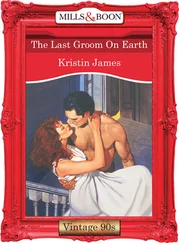I sighed. She was better for the moment, which meant she was back to refusing co-operation. I would probably have to wait until she damaged herself further before we could make any more progress. “Okay. One other thing. You didn’t tell me any more about what you did in the war.”
“I have given you detailed accounts during previous sessions.”
“Well, yes and no, I don’t think you really covered everything—”
“I have divulged all that is necessary.”
“Is there more?”
“There is nothing relevant.”
A muscle under her left eye twitched.
Kwame didn’t look like he wanted to talk, but he did at least turn up in my office at the appointed time for therapy. “Well, it seems we can finally offer you the thing you’ve been looking for, Kwame,” I said.
“I have been expecting it.”
“Yes. Well. If you still want it, the ICT is prepared to launch an investigation and potentially a prosecution regarding the nuclear war on your world. You’d have to remain in custody for the duration of the investigation, I’m afraid, but you can continue with your therapy if you want.”
He looked away.
“This is what you’ve been asking for, isn’t it?”
“It is,” he said, rather wistfully. “It was.”
“Have you changed your mind?”
“I do not know… I do not understand…” He looked back at me. “I am no longer sure it is me that needs to be prosecuted.”
“Have you been working on the list I started for you?”
“I have.”
“Have you found anything out?”
“Only that the more I look, the less I understand.”
“Can you show me?”
He took a deep breath and looked at the wall. “I need access to my home folder,” he said. I turned the wall into a screen and brought up his folder for him. “UserKwame VC Activate,” he said.
“ Voice control activated for User Kwame Vangona. ” Kwame was unable to use a keyboard without summoning one that was massive and designed for fingers the size of fists, which was about as fine as his motor control would permit.
“UserKwame open file home slash timeline slash timeline nine.”
The file sprang open, and I could see how busy he’d been: two columns full of jottings, spattered with notes and questions, another column for things he hadn’t been able to place elsewhere. I couldn’t help standing up to take a closer look.
“This is very impressive. It’s good work,” I said.
“I have not finished.”
“I didn’t expect it to be perfect. This is more than enough to be going on with. What does RY mean?” I pointed to a column of numbers running down the left hand side, all labelled ‘RY’.
“Railway Years,” said Kwame.
“So you’ve managed to tie it down to actual dates?”
“In places. Some things are more vague than others.”
“I’m sorry, I have to ask — why is it Railway Years?”
The question surprised him. “Oh… my world was never able to agree on a common system for dates. But when railways were first built and had to go across the whole of Africa, they needed to publish timetables that everyone could read. So they started a new calendar just for the railways, and eventually everyone used that. It was not perfect, but we could never have agreed any other system. It would only have started a war.”
“I see. So this is when you were born. 116 RY.” I pointed at the top of the leftmost of the two main columns.
“Yes. These are the memories I know to be mine.”
“And the second column is…”
“The other memories. The other man.”
“Where’s the first time you have conflicting memories?”
He sighed and walked to the wall. “Here.” He pointed to a period during what must have been his childhood, around 129 RY. “I went to a good school. My father was a university lecturer, my mother… my mother did everything she could to hide her politics. But she still made me aware of the issues of poverty. One summer she left me with a family she knew in the slums in Zimbabwe City. It opened my eyes. And I remember there was a film showing, a war film my mother would have hated. My hosts took me to see it — it was a terrible imperialist thing about the Great War but the kind of thing boys like. At the same time…” He indicated the second column. “I remember I was in a street gang. We robbed a drunkard and used the money to go to the cinema and see the same film. But I was never in a street gang. My hosts were poor but they never let me do that kind of thing. That is the first problem…
“And then later, I think here…” He pointed out 132 RY and a note on the second column. “I remember… we beat up a queer. I mean a homosexual. We found a club they went to and started robbing them. None of them could call the police. They would have had to explain why they were there. But… there are two things. I was at school in that year, a private school far away. So I could not have been there, on the streets. And also I remember being… ashamed. And guilty. These men we were beating… I knew they were queer and that was wrong but still…”
He shook his head. “I felt… I looked at the boy who led us… and I felt… I felt… he was so…” He lapsed for a moment, unable to give voice to the desire. “And I think, I think I was scared because I realised what they would do if they found out what I… that I… that I felt… that.
“So I stopped running with the gang. I stopped avoiding school. It was a horrible place in the city, not the one my parents sent me to. I remember the other school as well, in the country, the private school. I could not have been at two schools…”
“So there are two boys here,” I said.
“Yes. Two boys.”
“When’s the next time the memories clash?”
“Around here. The late thirties, the early forties.” He indicated a period from roughly 138 to 143 RY. “When I finished my schooling, I did national service. I did not have to but I think I had something of my mother in me. I wanted to serve with the ordinary men, not go straight into the military as an officer. But the dates are wrong. I should have done national service here—“ He indicated 134 RY on the first column. “But I remember doing it here.” He indicated 138 RY on the second column. “It is four years too late. By this time I had finished national service, been to university and joined the army as an officer. And then I was deployed to Horonga.” Horonga seemed to equate to the Straits of Hormuz, which were narrower on his world, and apparently a frequent flashpoint for conflict.
“Ah. So the other man is younger?”
“Yes. About four years.”
“So what happened in his timeline? Column two?”
“No war. I remember being in the army, but not fighting in Horonga. I was… it is complicated. It is…”
“Just go slowly, Kwame.”
“I met… men. I remember doing things… I feel I should be disgusted. But the disgust is… hollow. I do not understand it.”
“Let’s stick to the events. Where were you stationed? In the second column, I mean?”
“The first year was national service. That was a guard station in the south of Mutapa, the border watch. When it was done, I think… I seem to remember they asked me to stay. They said I had skills for engineering and electronics and they wanted to train me.”
“You do have some aptitudes in that direction…”
“Yes. I know.” He seemed distinctly troubled.
“Go on,” I said.
“They sent me to a college in a port city. Matongu. They had Chifunyikan teachers there. They were assisting our military in updating our equipment. I learnt how the new systems worked. Biofeedback, conscious control, detection of the enemy through biological signatures. Things such as these. But this is not all. It was a military city. There was always a laxness in the armed forces. There were many places used by homosexuals.”
Читать дальше
